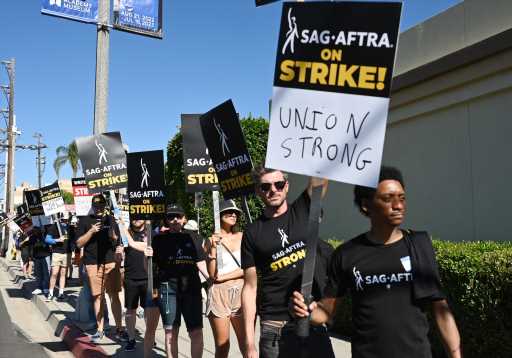SAG-AFTRA Says Companies “Wouldn’t Meaningfully Engage” On Key Issues Leading Up To Strike
Saying that “we’re fighting for the survival of our profession,” the SAG-AFTRA leaders tonight released the details of just how far they and the companies were when contract talks broke off and the performers launched their first strike against the film and scripted TV industry since 1980. “We moved on some things, but from day one they wouldn’t meaningfully engage on the most critical issues,” they said in a communique to members.
Related Stories
AMPTP Responds To SAG-AFTRA Strike: “Union Has Regrettably Chosen A Path That Will Lead To Financial Hardship For Countless Thousands”
SAG-AFTRA Chief Negotiator Duncan Crabtree-Ireland Says Union & AMPTP “Pretty Far Apart On AI”; Studios “Concerned About The Immediate Impact” Of Strike
“Here’s the simple truth: We’re up against a system where those in charge of multibillion-dollar media conglomerates are rewarded for exploiting workers,” the negotiating committee wrote “The companies are committed to prioritizing shareholders and Wall Street. Detailed below are some of the key issues of the negotiation and where things stand.”
See the guild’s list of all the SAG-AFTRA proposals and AMPTP counters below (or click here).
Here is the bulk of the guild’s statement on where the things stand now (read it in full here), including the tentative agreements that were reached, as well as proposals strategically withdrawn as part of the negotiating process:
- Performers need minimum earnings to simply keep up with inflation.
- Us: We need an 11% general wage increase in year 1 so our members can recover from record inflation during the previous contract term.
- Them: The most we will give you is 5%, even though that means your 2023 earnings will effectively be a significant pay cut due to inflation and it is likely you will still be working for less than your 2020 wages in 2026.
- Us: Here’s a comprehensive set of provisions to grant informed consent and fair compensation when a “digital replica” is made or our performance is changed using AI.
- Them: We want to be able to scan a background performer’s image, pay them for a half a day’s labor, and then use an individual’s likeness for any purpose forever without their consent. We also want to be able to make changes to principal performers’ dialogue, and even create new scenes, without informed consent.
And we want to be able to use someone’s images, likenesses, and performances to train new generative AI systems without consent or compensation.
- Performers need qualified hair and makeup professionals as well as equipment to safely and effectively style a variety of hair textures/styles and skin tones.
- Us: How about consultations with qualified hair and makeup professionals for all performers on set to ensure equity for performers of color, and a requirement to have the proper tools and equipment?
- Them: Begrudgingly, we will do this for principal performers, but background actors are on their own.
- Us: Consider this comprehensive plan for actors to participate in streaming revenue, since the current business model has eroded our residuals income.
- Them: No.
- Us: Contribution caps haven’t been raised in 40 years, imperiling our pension and health plans. Would you consider raising the caps to adjust for inflation and ensure that all performers, regardless of age or location, receive equal contributions?
- Them: Here are some nominal increases nowhere near the level of inflation that won’t adequately fund your health plan. Also, background child performers under 14 years of age living in the N.Y. zone don’t deserve pension contributions, which is why we haven’t paid them since 1992.
- Us: These timelines we’ve proposed help series regulars by limiting the increasingly long breaks between seasons and giving them some certainty as to when they’ll start work again or will be released.
- Them: Take these select few improvements that will only help a select few.
- Us: Drop the ruse that series regulars are becoming residents of a new state or country when they go on location, and adequately pay them for all of their relocation costs.
- Them: Here’s some stipends which don’t realistically reflect the cost of relocating to an out-of-state or out-of-country production.
We marched ahead because they intentionally dragged their feet.
After we agreed to their compressed bargaining schedule, the AMPTP subjected us to repeated stonewalling and delays. It took more than four weeks of bargaining for the AMPTP to agree to simple basic issues of fairness and respect, such as:
- Access to reproductive healthcare and gender affirming care for performers working away from home in states that restrict medical access.
- A consultation process to guard against racist and sexist “wiggings” and “paintdowns” of stunt performers.
- Safety for performers working with animals on set.
Here are all of SAG-AFTRA’s proposals and AMPTP counters, per the guild:
Must Read Stories
Dispatches From The Picket Lines: Waivers Update, Rep. Adam Schiff, Moody’s Forecast & More
Lionsgate In Pole Position To Acquire Entertainment One As Hasbro Trims All But Core Businesses
CBS To Air ‘Yellowstone’, ‘SEAL Team’, BBC’s ‘Ghosts’ & More In Reality-Heavy Reworked Fall Schedule
Peacock Raising Prices For First Time Since NBCUniversal Streamer’s 2020 Launch
SAG-AFTRA Strike
SAG-AFTRA Working “As Fast As We Can” On Waivers For Indie Productions; Approvals Could Be Public By Tuesday
Dispatches From The Picket Lines: David Duchovny Joins ‘The X-Files’ Reunion As Rosario Dawson, Kaitlyn Dever & Hilary Duff Strike For “Fair” Deal On Residuals & AI
Read More About:
Source: Read Full Article







